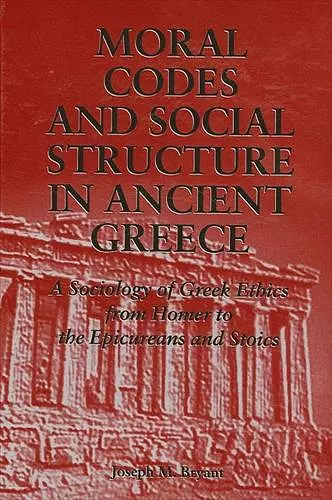Moral Codes and Social Structure in Ancient Greece
A Sociology of Greek Ethics From Homer to the Epicureans and Stoics
Format:Paperback
Publisher:State University of New York Press
Published:3rd Jul '96
Should be back in stock very soon

An exercise in cultural sociology, Moral Codes and Social Structure in Ancient Greece seeks to explicate the dynamic currents of classical Hellenic ethics and social philosophy by situating those idea-complexes in their socio-historical and intellectual contexts. Central to this enterprise is a comprehensive historical-sociological analysis of the Polis form of social organization, which charts the evolution of its basic institutions, roles, statuses, and class relations. From the Dark Age period of "genesis" on to the Hellenistic era of "eclipse" by the emergent forces of imperial patrimonialism, Polis society promoted and sustained corresponding normative codes which mobilized and channeled the requisite emotive commitments and cognitive judgments for functional proficiency under existing conditions of life. The aristocratic warrior-ethos canonized in the Homeric epics; the civic ideology of equality and justice espoused by reformist lawgivers and poets; the democratization of status honor and martial virtue that attended the shift to hoplite warfare; the philosophical exaltation of the Polis-citizen bond as found in the architectonic visions of Plato and Aristotle; and the subsequent retreat from civic virtues and the interiorization of value articulated by the Skeptics, Epicureans, and Stoics, new age philosophies in a world remade by Alexander's conquests-these are the key phases in the evolving currents of Hellenic moral discourse, as structurally framed by transformations within the institutional matrix of Polis society.
"This is a challenging reappraisal of major developments in Greek society between the Dark Ages and the flowering of Hellenistic culture. Historians of Greek political life and of Greek philosophy will need to think again about the relationships between social structures and philosophical ethics, between brute economic or material facts and moral ideology. Bryant makes a strong case for the pertinence of historical sociology of a broadly Weberian kind to the understanding of ancient Greek civilization. Anyone inclined to take the historical dimension of ethics seriously will welcome this detailed case study of the interactions between politics, sociology, and moral theory in classical Greek culture."—Brad Inwood, University of Toronto
"This is as sociologically and culturally deep and thorough a work on ancient Greek life and thought, up through the Hellenistic period, as one can find in the literature. I found it an enjoyable, at times fascinating, work to read." — Randall Collins, University of California, Riverside
ISBN: 9780791430422
Dimensions: unknown
Weight: 816g
575 pages